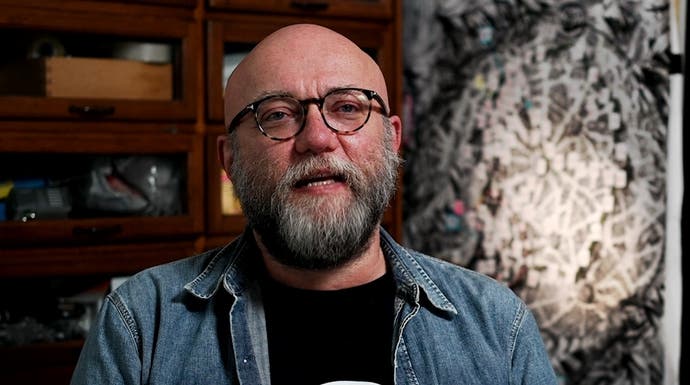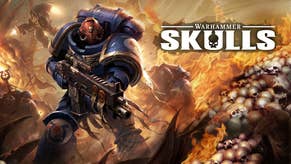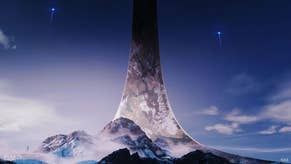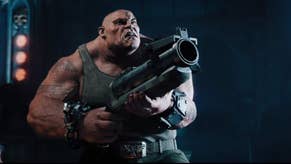An interview with Warhammer 40,000 author Dan Abnett, who's writing Fatshark's Darktide
"This is Nurgle at its most horrible."
Dan Abnett has a lot to say about Warhammer 40,000 - and so he should. The author behind some of the most beloved Warhammer 40,000 books ever written has been thinking about the lore of Games Workshop's grim dark universe for 20 years. But it's not all about the Space Marines stomping about imperiously, shouting "for the Emperor!" while blasting all in their path to bits with guns large enough to suit a tank. In penning the Gaunt's Ghosts series, which is about Warhammer 40,000's regular human infantry, and the Eisenhorn trilogy, which is about inquisitors who hunt down heretics and demons, Abnett gave Warhammer 40,000 a more human face. Unlike the genetically boosted Space Marines, bog standard humans are squishy, vulnerable and, crucially, relatable. It's exactly this expertise that sparked Abnett's involvement with Darktide.
Warhammer 40,000 Darktide is the next game from Fatshark, the developer of the much-loved Vermintide series of fantasy Warhammer games. Like Vermintide, Darktide is a co-op focused first-person shooter / melee hybrid in which you fight against the odds. Yes, it's yet another Warhammer 40,000 video game in a sea of Warhammer 40,000 video games - that sea just swelled to ocean scale, by the way - but Darktide stands out because it's a bit different. You do not play as a Space Marine pushing back the xenos on an alien world in some universe-shattering galactic war. Instead, you play an ogryn, what I think is a tech priest, and perhaps an Imperial Guard soldier or two (Fatshark is keeping a lot of its cards close to its chest at the moment) - a motley crew that ends up helping an Inquisitor investigate a mysterious Nurgle-worshipping cult that's spreading across a continent-sized hive city.
This is why Fatshark wanted to work with Abnett to create Darktide's world. He's been thinking about Inquisitors, the Imperial Guard and hive cities for years. Who better to flesh out Darktide's virtual innards with all the gurgling horror befitting the (best) chaos god, Nurgle?
You can probably tell by now that I'm a sucker for Warhammer 40,000 lore. And so when I was presented with the chance to interview Dan Abnett and game director Anders De Geer about Darktide's story, I just had to do it. Read on for what I can only describe as a Warhammer 40,000-themed high-five across a Google Meet.
How did your involvement come to be?
Dan Abnett: I was basically invited! Simple as that. I've got some previous form when it comes to Warhammer 40,000. And also games, come to that. And it seemed like a fun thing to do. The guys at Fatshark asked me if I'd want to be involved. They had begun to structure what they wanted to do. So there was a rough landscape of what it was going to be. And obviously, I had enormous faith in them, because I knew Vermintide was extremely cool. And we just sort of went from there, where it was really a matter of me brainstorming with them, and filling out the gaps. You know, we want something like this, how can we finesse that? What can we resolve it into?
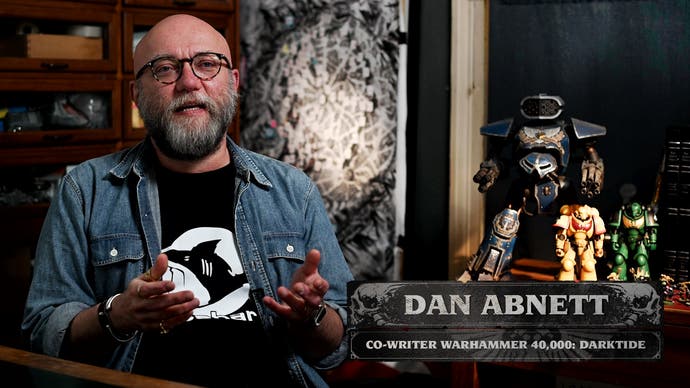
I have to say I've really enjoyed it. As somebody who's essentially worked in the Warhammer universe for over 20 years, in all sorts of different forms, in novels, in comics, and also obviously observing what Games Workshop do in terms of the game, the amazing artwork and the amazing miniatures, it's so much fun to translate all of that imagination, all that stuff I thought about or imagined into a new form. And in this case, something that is sensory and moving and, as it were, real. I'm not saying come to life for the first time, but come to life in a completely different way for the first time. And that's been a real treat. And I think they're doing an amazing job of it.
At that early stage, what did you know of Darktide? What exactly were you told and exactly what were you then charged with doing?
Dan Abnett: The basic premise existed. They knew what they wanted to do, they knew what sort of setting they wanted, and what the mechanics of the game would be, and therefore what sort of characters and situations we would need to create in order to support that. But most of it was a blank slate. So we knew, for instance, we wanted a Hive world, a Hive city, but it wasn't named, and we didn't know much more about it than that. So it was a matter of then exploring that and working out all the possibilities and picking through the lore and imagining things and coming up with stuff like that.
We knew also that it is essentially structured around the idea of an investigation being conducted by the Inquisition, who are the super police force. Every Inquisitor is different, so we needed to then develop the character of him and his key personnel and what exactly he was doing, what threat were they investigating? These sorts of things.
So in other words, they built a machine where they knew where everything needed to go, and it was a matter of going, okay, what does this actually look like? Or what do we actually need to do to finesse that? And as we've gone along, talking every step of the way and doing either really granular little details, or really big world-building stuff, some other things have developed, some just ideas about how the game would work have come out of those discussions and ideas. Some of these, I think, will be very profitable indeed, and will make the game a better experience.
Anders De Geer: Dan was involved in the project even before Dan knew he was involved in the project! We started very early to decide on which approach we wanted to have to the 40k universe. Learning a lot from Vermintide, we wanted to keep the banter between the characters and some of the ways we told the story. We knew we wanted this to be a fair portrait of the world. So, even before Dan joined, we recommended everyone read up on the Gaunt's Ghosts and Dan's books, because they also reflect that part of the universe that we knew that we wanted to catch.
You aren't going for Space Marines, which is usually what we see from 40k video games. To me that's refreshing! Why did you decide to avoid Space Marines?
Anders De Geer: We wanted to keep Darktide in the same vein as Vermintide, where we approached it from a slightly different angle. Humans have a huge part of that. Having a group of regular human beings - if you can even call them regular humans! - creates a lot of interesting situations and a lot of opportunities to tell the stuff that would otherwise be harder to tell.
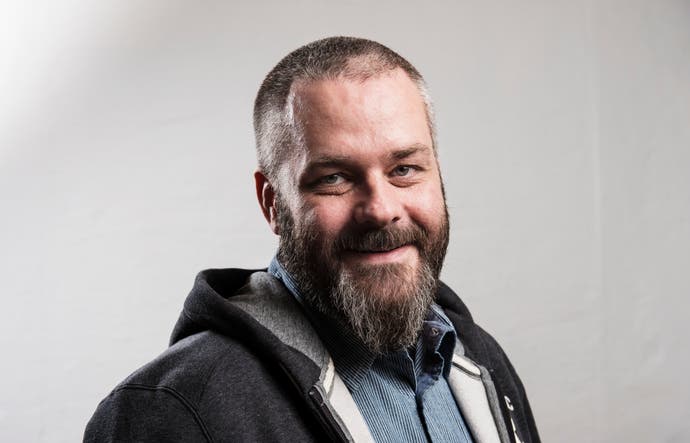
Of course, I have to say that pitching not using Space Marines was very scary! I knew that it could make or break the outcome.
Dan Abnett: One of the main reasons for doing it, though - and this was a decision that was made before I joined the project - is, as you'd expect, that's what you would expect when you play a 40k game. Space Marines are fantastic. They are the iconic poster boys of this universe. They're the one thing everybody thinks about when they think about Warhammer 40,000. So to deliver a different playing experience, to leave them out and move, as it were, down a step to your regular human level of experience, was a really bold and really clever thing to do.
I think I was recruited mainly for my experience of working in the universe. But it's actually something I've almost always done in my far too many novels set in the universe, which is I tend to steer towards the human level characters. I've written a few Space Marine novels, but by and large, the Gaunt's Ghosts series is all about regular Imperial Guard, and the Eisenhorn books are about essentially regular human beings. I find that is a much more relatable status from a reader or a player's point of view - they can connect to a regular human. Space Marines are fantastic, but they're quite detached. They don't display emotion or variations of character that you can sink your teeth into.
With this game in particular, there are certain things the guys are trying to achieve where being a human in the middle of it is much more interesting. It's a much more compelling type of gameplay. If you were an essentially invulnerable Space Marine with a huge Boltgun walking through the middle of it, after a while it would get repetitive because you'd be destroying everything you come across.
Whereas the human perspective gives you so many great opportunities. First of all, there is a fairly high degree of survival horror in this game. So being human makes you feel more vulnerable. So it amplifies the sense of the danger that you're in. You're small, you're mortal, you're stuck in this extraordinarily huge environment that is very, very dangerous. It also, I think, is a much greater way of communicating, particularly for people who aren't already fans of Warhammer 40k, the background of the universe to them. They can learn much more about what this place is by being a human in it, than by being this non-responsive Space Marine character.
And the other thing in terms of the actual gameplay is there is a co-op element to this. As a vulnerable mortal human being the only way to survive is to trust and work with your teammates, because you're not going to stand a chance otherwise - you're not going to be the last Space Marine standing. That's really great - the very nature of who you are and what you are ties in beautifully with the gameplay to enhance that experience. So actually, rather than just artificially forcing yourself to work with others, it becomes a necessity because of the very nature of the person that you're playing in the game.
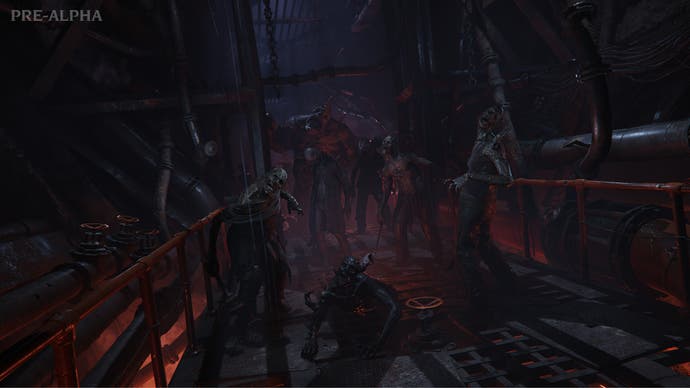
Will fans of your books, which as you say are more focused on the human element, see some of what they love of them in Darktide? I'm thinking specifically of Eisenhorn and Darktide also having an Inquisitor.
Dan Abnett: I really, really hope so! That's part of what we've worked towards. The game is structured from the point of view that you essentially start off as a prisoner who is recruited, whether you like it or not, by an inquisitorial investigation that needs manpower. And essentially, you've got everything to prove, once you're there, because you've got everything to lose. You're shown no favours. You've got to prove you're valuable to them and can be worthwhile.
Spoiler alert! I can't go into huge detail, but it does mean there is a core cast. There is a core Warband of characters - the Inquisitor and the core team - that you're going to have to interact with. They are the sort of colourful characters you've seen in Eisenhorn or the Ravenor books.
The Inquisitor has a very unique personality. They've got their own agenda, their own MO, they do things in their own particular way. They recruit, they handpick the people they work with. So there is that sense that this has got a distinct character. Again, one of the things that would have happened with Space Marines is - there is variation in Space Marines - but if you were a Space Marine recruited to a Space Marine chapter, then there would be this kind of, oh it's just like every other time you have that experience. Whereas there is nothing like this Warband because there is nothing like this Warband.
That human camaraderie and interaction that you see inside a Gaunt's Ghosts book, which are all soldiers together, there's a lot of that too, because it is that teamwork. It's not a regiment, it's more a squad level thing, but you are still, to all intents and purposes, a soldier trying to work with people against terrible odds in this urban environment.
So there's a bit of both of those things. From my experience over the years, those are the things that people have loved in the books - they've loved the personalities and the characters, and they've loved the sense of comradeship and teamwork. This is something the guys have really captured, I think, in the way the game works.
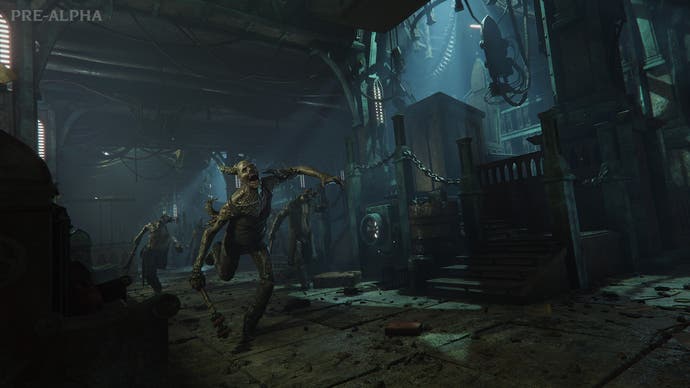
There are aspects of Darktide I'm still not sure of, that fans are trying to piece together based on the assets you've released. Who exactly are the four playable characters? I spot an ogryn - obviously, everyone spots the ogryn! And I think a tech priest? There's a guardsman? I'm not sure if there are two guardsman there. Who are we playing as in this game?
Anders De Geer: I wish we could answer this right now, but we are not allowed to talk about it yet.
Dan Abnett: I think we can safely say that there is a really appealing cross-section of opportunities for the player to play, and they will correspond to some of the key things in the universe that you would be interested in playing.
And we're also, I think, allowed to allude to the fact that the Warband itself is obviously quite large, even though you're probably playing in a small squad dynamic. So there are other characters you're not necessarily seeing in the assets you've seen, who you will be relating to in terms of being briefed or trained or given instructions. There is a sense of a greater cast.
We're under strict instructions not to say certain things! But yeah, we can say there's a nice variation. And I have to say that you have fairly accurately identified some of the things, as far as they can be determined from the visuals you've seen. I can confirm there's an ogryn!
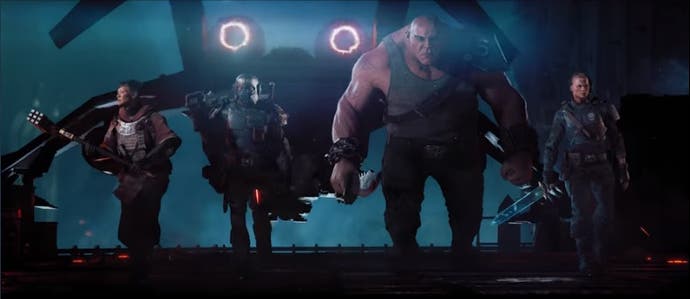
The opportunity to play as a guardsman in a first-person Warhammer 40k video game is fantastic to me. I've not had that before. They've been a playable faction in Dawn of War, but the idea of actually being first-person with a guardsman is a thrilling concept to me, just because they're not a Space Marine - they're squishy. From a story perspective, what opportunity does a guardsman give you that you wouldn't have got from a Space Marine?
Dan Abnett: First of all, I agree with you completely. I am a huge fan of the Imperial Guard anyway, but as you've seen from the assets that have been released so far, just the idea of being up close and personal with a character who is handling a lasrifle, the standard kit we've read about in so many stories, to me that's brilliant! It's amazing to see those things come to life and feel solid and real and have weight and heft to them. So that's great.
The dynamic is that you are being recruited, you're press ganged against your will into this. The Inquisitor is running an operation where he needs people with particular skill sets - let's put it that way. He needs soldiers. He needs technical experts. He needs people who can do particular things. He's got an enormous area to investigate. The hive city is colossal. It's an enormous world within a world. It's the size of a continent. And in order to get at the root of the evil, the chaos taint lurking in this environment - you could send the Space Marines in, you could even send the Imperial Guard in en masse, but it would probably drive it further underground. You wouldn't be able to eradicate it.
So what he's trying to do is to use his agents on a smaller, slightly more subtle level, to search for clues, to find things, to gather information, to shut down the enemy where they find it, so they've got some chance of pulling this thing up by the roots. They don't want to lose the Hive City. They don't want it to become a foothold for chaos. But it's a very important Imperial asset, so at the same time they don't want to just flatten it from orbit and have done with it.
So, it's the sort of environment in which a good Imperial guardsman with decent battlefield training is going to be a really great asset. Small enough, light enough to move around, to interact, but also reasonably formidable when it comes to dealing with things that lurch out of the dark at you when you're least expecting them. It's the sort of mission you would send squads of Imperial Guard on, but these have been laundered into the service of the Inquisition, as the Inquisition so often does - particularly good soldiers warriors, they will recruit them for their purposes.
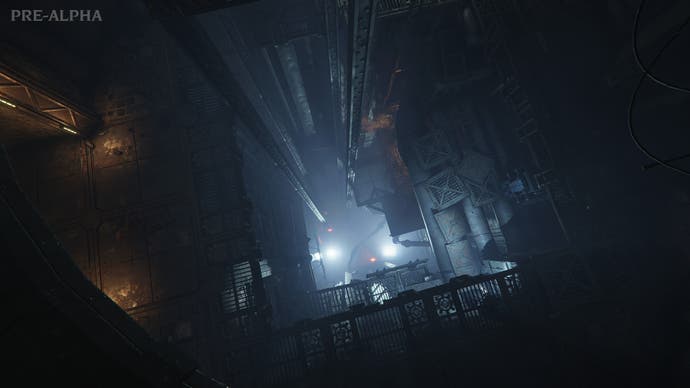
You've mentioned there's some sort of chaos presence that's being dealt with. Is there any more information on that, or the Inquisitor character?
Dan Abnett: This hive, which is called Tertium - it's a sub-sector capital, so it's a very important location that's essentially indirectly in control of several neighbouring planets, very important trade route, all that sort of stuff, population of billions. But there are clear signs, as far as the Inquisitor is concerned, that something is afoot in there, that there is a problem. There are problems all the time - there's crime and all sorts of stuff going on in the hive city. It is worth bearing in mind that the hive city is not a particularly safe place to go anyway, even if there isn't a threat in there. But there is a threat. And it appears to be a chaos uprising that's being driven by a cult called the Admonition . It is spread throughout the hive. It's cellular, and it appears to be worshipping Nurgle.
So we are in some respects picking the least expected source for this, which means we have all sorts of really... we're leaning into the body horror quite heavily here, which is great for this kind of game. It is both literally and metaphorically spreading through the hive, and they've got to find it and purge it and stop it contaminating other bits of the hive as well.
And again, just like we have the human element, perhaps not quite what you're expecting! You were probably expecting one of the more glamourous... oh, it's Khornate or it's Slaanesh! But no. This is Nurgle at its most horrible, which is quite fantastic. There have been moments when Anders has shown me things and I've gone, oh my god!
I think Nurgle is a fantastic choice - it's in keeping that Darktide isn't the poster boy Warhammer 40k game. I'm a big fan of some of the Nurgle-related books. I often listen to them in audiobook form, and when the narrator is voicing a Nurgle character they really go from the jugular. Some of the things described in the Nurgle books, your mind goes, oh my god, what would that look like? Maybe we'll actually get to see that with this game?
Dan Abnett: You will! There is a certain amount of real tension in playing the game in that survival horror mode. Even if you can't see anything, you're moving around and you're searching and you're thinking, exactly what is lurking here, and how horrible is it going to be? And how horrible is what's going to happen to me if it gets the better of me?
And then you get what I suppose we could describe as jumpscare moments when things are revealed or things attack, and quite often they are really quite nasty. It doesn't let you off the hook. Any chaos cultist from any of the four corners of chaos, would be a pretty unpleasant surprise to come charging around a corner. But some of them are more almost exciting. If it was some Khornate Berzerker you'd be going, wow, Khornate Berzerker! He's going to kill me, but even so, wow! Whereas this has got that horror movie feel, where some of the things that are coming, it's like, I really did not want to meet that coming the other way down this tunnel. That I think is going to be really effective. We want to get people's pulses up a little bit, either because they're waiting for something to happen, or when something does happen it's not a let down. It's a, oh god! Quick, get out of here! It should be very effective indeed.
Warhammer 40,000: Darktide is due out on PC and Xbox Series X and S in 2021.
